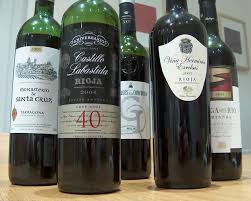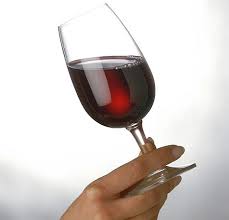 Selecting a bottle of wine is similar to
buying a stock listed on the stock exchange, or picking the number where the
circulating little ball will land on the wheel in roulette or betting on the
last draw in a game of stud poker—it is always a gamble. There are no magical
formulas or sure-fire rules in any of these “games” of chance to guarantee the
right choice. The best we can do in any of these situations is make an educated
guess or trust our instincts and hope for the best or to paraphrase an old
poker adage, you pay your money and take
your chances.
Selecting a bottle of wine is similar to
buying a stock listed on the stock exchange, or picking the number where the
circulating little ball will land on the wheel in roulette or betting on the
last draw in a game of stud poker—it is always a gamble. There are no magical
formulas or sure-fire rules in any of these “games” of chance to guarantee the
right choice. The best we can do in any of these situations is make an educated
guess or trust our instincts and hope for the best or to paraphrase an old
poker adage, you pay your money and take
your chances.
This was the precarious situation I found
myself in the other night when I went to buy a bottle of wine to top off a
fun-filled day of exploration at the Museum of Fine Arts in Boston. In my mind
there was no margin for error. Such a
pleasant day deserved a bottle of wine that I knew would not disappoint. Much
to my chagrin all of my usual favorites were sold out and now I faced the tenuous
task of buying a bottle of wine we never had before. At first I was attracted to a bottle of Spanish
Rioja labeled Estate Grown. Past
experiences though have taught me that I usually have more success with wines that
have been aged more than those that are estate
grown. This does not only apply to wines from Rioja but with most wines in
general. With today’s modern wine making
techniques, barrel aging seems to be more important than terroir in determining quality; a concept that has taken me time to
embrace.
 My next possible choice was a wine from Cahors; one of my favorite, lesser
known wine producing regions in France.
Although I usually enjoy wine from Cahors
the label warned me that this wine might not be what I would expect from this
wine producing region. Prominently
displayed on the front label were the words
Malbec and Merlot below the
producer’s name. With the exception of
the wine from Alsace, French wine labels normally state only the producer and
wine producing region of origin (terroir), not
the grapes that the wine is made from. Wine label’s emphasizing the grapes the wine
is made from is a practice of new world producers, such as the United States. To
prominently display the names of the grapes on the label, as this wine did, indicates
that this wine was made for the export market, not for domestic consumption. As such, this wine will not have the “style” that I expect from a French
wine made for the French consumer. Using this rationale as my guide I rejected
this bottle of wine too.
My next possible choice was a wine from Cahors; one of my favorite, lesser
known wine producing regions in France.
Although I usually enjoy wine from Cahors
the label warned me that this wine might not be what I would expect from this
wine producing region. Prominently
displayed on the front label were the words
Malbec and Merlot below the
producer’s name. With the exception of
the wine from Alsace, French wine labels normally state only the producer and
wine producing region of origin (terroir), not
the grapes that the wine is made from. Wine label’s emphasizing the grapes the wine
is made from is a practice of new world producers, such as the United States. To
prominently display the names of the grapes on the label, as this wine did, indicates
that this wine was made for the export market, not for domestic consumption. As such, this wine will not have the “style” that I expect from a French
wine made for the French consumer. Using this rationale as my guide I rejected
this bottle of wine too.
 Undaunted in my quest for just the right
wine and now with the taste of a Spanish wine firmly affixed in my mind, I
returned to the Spanish wine section. I
ruled out a bottle of wine from Catalunya
made from Tempranillo and Garnacha as possibly not right because
of the inclusion of Garnacha, a grape
I usually associate with lighter bodied Spanish rosé wines. As luck would have
it, on the shelf below the wine from Catalunya
stood a bottle of wine from Rioja
with the sought after word Crianza on the label; which
according to Spanish law means that this wine must be aged for a minimum of two
years, one of which is in oak.
Undaunted in my quest for just the right
wine and now with the taste of a Spanish wine firmly affixed in my mind, I
returned to the Spanish wine section. I
ruled out a bottle of wine from Catalunya
made from Tempranillo and Garnacha as possibly not right because
of the inclusion of Garnacha, a grape
I usually associate with lighter bodied Spanish rosé wines. As luck would have
it, on the shelf below the wine from Catalunya
stood a bottle of wine from Rioja
with the sought after word Crianza on the label; which
according to Spanish law means that this wine must be aged for a minimum of two
years, one of which is in oak.
My
patience and rational was immediately rewarded when I opened this 2009, bottle
of wine from Rioja, produced by Montecillo. On the nose the aromatic
effects of wood aging were pleasantly noticeable combined with tantalizing whiffs
of black cherries. Our palates were equally entertained by a sumptuous, full
bodied wine with notes of black cherry that “opened up” to luscious black
cherries coated in dark chocolate. All this for $11.99!
 It would
nice to say that all of my mental machinations, rationalizations and the likes
always lead to such a pleasurable conclusion, sadly this is not true. There are
times, in spite of all my best efforts and careful considerations that I have
been terribly disappointed by wines whose labels have all the rights words but
the wine itself does not have the expected taste sensations deduced from the
label. In this one brief shining moment
though, I paid my money and I was duly rewarded with a very enjoyable bottle of
wine.
It would
nice to say that all of my mental machinations, rationalizations and the likes
always lead to such a pleasurable conclusion, sadly this is not true. There are
times, in spite of all my best efforts and careful considerations that I have
been terribly disappointed by wines whose labels have all the rights words but
the wine itself does not have the expected taste sensations deduced from the
label. In this one brief shining moment
though, I paid my money and I was duly rewarded with a very enjoyable bottle of
wine.

No comments:
Post a Comment